
DGBI (Disorder of Gut-Brain Interaction) or Functional digestive problems is a medical condition affecting the digestive system, where patients do have various different kinds of problems related to food and digestion, but there is no disease in any of the digestive organs. The problems faced by patients are due to malfunctioning of one or more of their digestive organs (food pipe, stomach, small intestine, or large intestine). Hence the investigations and tests turn out to be normal. It may occur alone or along with any other disease of the digestive system or other body systems. DGBI is very commonly seen along with GERD/Acid reflux/Hiatus hernia and Gallbladder stone. In such situations treatment of DGBI is necessary along with treatment or surgery for GERD/Hiatus hernia or Gallbladder stone. Then only patients will have optimum relief in their symptoms. IBS is a common form of DGBI affecting the small and large intestines, causing tummy pain, constipation or diarrhea, frequent urge to pass motion, the sensation of incomplete evacuation, and or feeling of gurgling in the tummy. Other forms of DGBI are Post prandial bloat syndrome, functional heartburn, hypersensitive esophagus, functional belching, and Rumunition syndrome which affects the food pipe and stomach. So you should get confused about the different names that the doctor speaks of or if it is written in your files.
Our brain and the whole digestive system are in a constant state of communication with each other, each and every second of our life. This communication happens by way of nerve signals as well as secretions of various chemicals, phytochemicals, and hormones. Communication is both ways, meaning signals are passed from the brain to the gut and to the brain. Any disturbance or imperfection in these communications can lead to various symptoms that are felt by the patient. Sometimes they are very trivial, causing no disturbance in the overall function of your body and not bothering you much. And at times, that can lead to disturbances in the functioning of your body, impacting your health, or causing significant symptoms that starts bothering you.
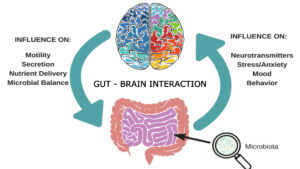
Let’s understand this with a few examples. One way of communication and signaling is from the Brain to the Gut. Like when we are planning to eat, or when we think of food of our liking, signals from the brain go to our gut causing salivation in our mouth and digestive juice secretion in the intestine for preparation for digestion. Such signals are passed for each of the actions related to eating, digestion, and passing motion. But in certain circumstances, this programming of sending signals gets faulty, sending wrong signals or sending signals at inappropriate times or of inappropriate intensity. The wrong signals sometimes do not allow the wall of your stomach or large intestine to relax adequately (loss of accommodation reflex), giving you a stretchy or bloated feeling or feeling of gassiness. So may a time when you feel too gassy, really there is not too much gas but there is an inability of your stomach to relax adequately. And these altered or inappropriate signals can cause various symptoms like belching, nausea, gurgling in the tummy, pain in the tummy, palpitation, or breathing difficulty.
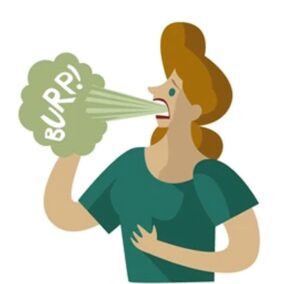
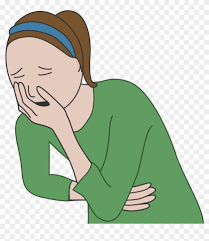
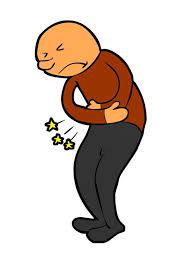
Similarly, the other path of communication is from the Gut to the Brain. For example whenever our stomach is empty signals go to the brain informing us that we are hungry. When we have eaten enough signal goes to the brain informing us that we are full now. When our rectum (the last part of the large intestine) is full of excreta, signals go to the brain informing us that we need to pass motion. But sometimes, the inner lining of your gut becomes oversensitive leading to some pain or burning or stretching sensation, feeling of something stuck or soreness in the throat, altered taste, constant or repeated urge to pass motion even if there is no infection or inflammation, ulcer, or too much gas in your tummy. It is quite common after a long-term digestive problem or some major digestive surgery.
Have you ever experienced a bitter taste in the mouth for a couple of days during some viral illness or when you are on some medications? This happens due to altered taste bud sensations due to illness or medications. Similar changes in sensitivity occur in the inner lining of your Gut organs, like the food pipe, stomach, intestine, and rectum due for a variety of reasons. And this may lead to symptoms like burning, pain, discomfort, bloating, fullness, feeling of incomplete evacuation, and repeated urge to pass motion. And the reports will show that the food pipe, stomach, and intestine are normal. This confuses a lot of patients and causes a lot of stress and fear. Hope this makes you understand why you suffer from some problems even when reports are normal.
All this can happen without any disease, meaning there is no infection, or any tumor, without acid coming up your food pipe, even when your food is getting digested properly, there is nothing really stuck in your throat, there is no excessive gas in your tummy, the food is going down your food pipe normally or there is no real diarrhea. This can happen due to a variety of reasons including previous digestive disease, long-term medications, other major illnesses, major stressful or emotional situations, and a very unhealthy lifestyle in general. All this also occurs due to habits like smoking, tobacco consumption in any form, alcohol intake, or addictive recreational drugs.
Of course in many situations, we need to examine the patient thoroughly and may also require multiple tests to confirm that there is no disease or a problem that needs to be fixed. Patients may need to undergo endoscopy, colonoscopy, esophageal manometry, 24 hr pH Impedance study, ultrasound, and/or CT scan depending on their problems. As I have said previously also, functional problems can overlap with a disease where treating only the disease will give poor outcomes. In such situations along with the treatment of the disease, treatment of the functional disorder is required to attain a good and lasting resolution of symptoms and regaining of health. The good part is that these functional disorders can be easily treated by psychomodulatory medications, stress management, and a proper diet.
Long-term suffering from such problems and the confusion about the nature of the problem both eventually lead to stress and anxiety if it is not treated appropriately. The stress and anxiety that develops from this problem will further aggravate the patient’s symptoms and will start a vicious cycle. All efforts should be made to break this cycle by aggressive treatment of the functional digestive disorder, any other associated disease, and stress/anxiety.
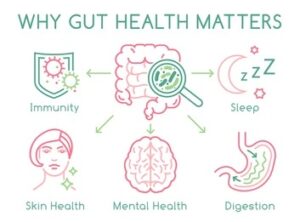
The Goal should be to control the symptoms and restore normal diet, life, and activity level. To reduce the frequency of intermittent symptoms, to reduce their intensity and severity when they occur. To learn the strategies to control them when they occur and not let them affect your quality of life.
With proper understanding, treatment, and support from the medical team, a normal diet, activity, and life are always possible for such patients.